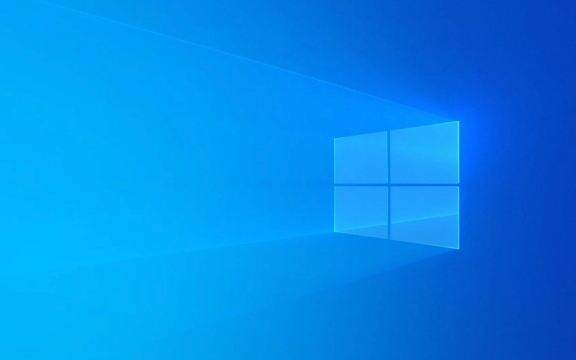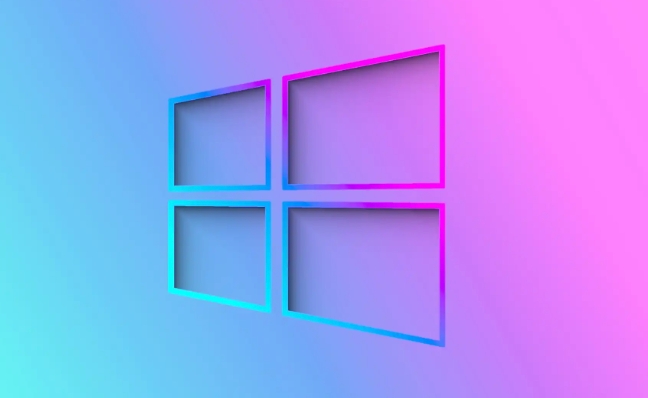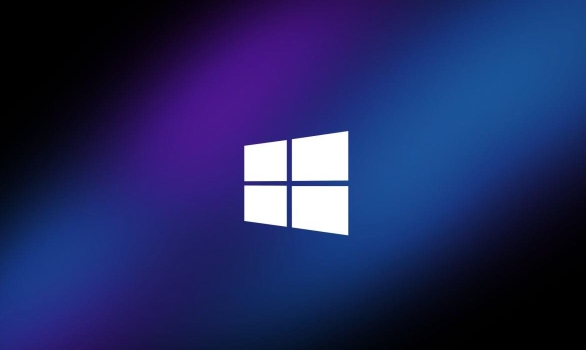Clean the camera lens and gently wipe it with a soft lint-free cloth to remove stains; 2. Update the camera driver to obtain the latest driver through the device manager or the manufacturer's official website; 3. Adjust the video resolution to the highest in the camera application and turn off the blur filter; 4. Improve the lighting conditions to ensure that the face is evenly lit and avoid backlighting; 5. Turn off the beauty or soft focus effect in the pre-installed camera software; 6. Test the camera in multiple applications to determine the range of the problem; 7. Fix or reset the Windows camera application; 8. If the above is invalid, check whether the hardware is damaged and consider using an external camera. Most blur problems can be solved by cleaning the lens and updating the driver, which is usually not a hardware failure.

If your Windows laptop camera is blurry, it's usually due to a combination of hardware, software, or environmental factors. Here's how to fix it step by step:

1. Clean the Camera Lens
The most common cause of a blurry camera is a dirty lens.
- Use a soft, lint-free clothes (like a glasses cleaning clothes).
- Gently wipe the camera lens (usually located at the top center of the screen).
- Avoid using water or cleaning sprays directly on the lens.
Even a small smudge can make the image look blurry, especially in low light.

2. Check for Software Updates
Outdated or corrupted drivers can cause poor camera performance.
Update the Camera Driver:
- Press
Win Xand select Device Manager . - Expand Cameras or Imaging devices .
- Right-click your camera (eg, "Integrated Camera") and choose Update driver .
- Select Search automatically for updated driver software .
If Windows finds an update, install it and restart your laptop.

Optional : Visit your laptop manufacturer's website (eg, Dell, HP, Lenovo) and download the latest camera driver for your specific model.
3. Adjust Camera Settings in Apps
Some apps (like Zoom, Teams, or the built-in Camera app) have their own resolution and focus settings.
In the Windows Camera App:
- Open the Camera app.
- Click the Settings gear icon.
- Look for Video resolution or Quality and set it to the highest option (eg, 1080p or 720p).
- If there's a Brightness , Contrast , or Focus option, adjust it accordingly.
Note: Most laptop cameras don't have auto-focus or manual focus controls, but some higher-end models do.
4. Improve Lighting Conditions
Poor lighting forces the camera to compensate, making the image grainy or blurry.
- Sit facing a window or light source.
- Avoid backlighting (eg, sitting with your back to a bright window).
- Use a desk lamp to illuminate your face evenly.
Good lighting can dramatically improve clarity even on low-resolution cameras.
5. Disable Camera Effects and Filters
Some laptops come with pre-installed camera software (like Dell CinemaColor or HP TrueVision) that adds filters or "beautification" effects.
- Open the camera app or manufacturer's camera utility.
- Turn off any beauty mode , soft focus , or skin smoothing features.
- Reset settings to default if possible.
These effects intentionally blur the image and can be the main reason it looks fuzzy.
6. Test the Camera in Different Apps
Try using the camera in multiple apps:
- Windows Camera app
- Zoom
- Microsoft Teams
- Google Meet
If it's blurry in all apps, it's likely a system or hardware issue.
If only one app has the problem, update or reinstall that app.
7. Reset or Reinstall the Camera App
If the built-in Camera app is acting up:
- Go to Settings > Apps > Installed apps .
- Search for Camera .
- Click the three dots and choose Advanced options .
- Click Repair , then Reset if that doesn't work.
This restores default settings and clears glitches.
8. Check for Hardware Issues
If none of the above helps:
- The camera lens might be physically damaged.
- Internal connections could be loose (common after drops or repairs).
- The camera module may be failing.
In this case:
- Contact the manufacturer or a repair technician.
- Consider using an external USB webcam as a reliable alternative.
Bottom line : Start with cleaning the lens and updating drivers—most blurry camera issues are fixed with these simple steps. Poor lighting and software filters are also common culprits. If all else fails, the hardware may need attention.
Basically, don't assume the camera is broken—most of the time, it's fixed.
The above is the detailed content of my win laptop camera is blurry how to fix. For more information, please follow other related articles on the PHP Chinese website!

Hot AI Tools

Undress AI Tool
Undress images for free

Undresser.AI Undress
AI-powered app for creating realistic nude photos

AI Clothes Remover
Online AI tool for removing clothes from photos.

Clothoff.io
AI clothes remover

Video Face Swap
Swap faces in any video effortlessly with our completely free AI face swap tool!

Hot Article

Hot Tools

Notepad++7.3.1
Easy-to-use and free code editor

SublimeText3 Chinese version
Chinese version, very easy to use

Zend Studio 13.0.1
Powerful PHP integrated development environment

Dreamweaver CS6
Visual web development tools

SublimeText3 Mac version
God-level code editing software (SublimeText3)
 Windows Security is blank or not showing options
Jul 07, 2025 am 02:40 AM
Windows Security is blank or not showing options
Jul 07, 2025 am 02:40 AM
When the Windows Security Center is blank or the function is missing, you can follow the following steps to check: 1. Confirm whether the system version supports full functions, some functions of the Home Edition are limited, and the Professional Edition and above are more complete; 2. Restart the SecurityHealthService service to ensure that its startup type is set to automatic; 3. Check and uninstall third-party security software that may conflict; 4. Run the sfc/scannow and DISM commands to repair system files; 5. Try to reset or reinstall the Windows Security Center application, and contact Microsoft support if necessary.
 Windows stuck on 'undoing changes made to your computer'
Jul 05, 2025 am 02:51 AM
Windows stuck on 'undoing changes made to your computer'
Jul 05, 2025 am 02:51 AM
The computer is stuck in the "Undo Changes made to the computer" interface, which is a common problem after the Windows update fails. It is usually caused by the stuck rollback process and cannot enter the system normally. 1. First of all, you should wait patiently for a long enough time, especially after restarting, it may take more than 30 minutes to complete the rollback, and observe the hard disk light to determine whether it is still running. 2. If there is no progress for a long time, you can force shut down and enter the recovery environment (WinRE) multiple times, and try to start repair or system restore. 3. After entering safe mode, you can uninstall the most recent update records through the control panel. 4. Use the command prompt to execute the bootrec command in the recovery environment to repair the boot file, or run sfc/scannow to check the system file. 5. The last method is to use the "Reset this computer" function
 Proven Ways for Microsoft Teams Error 657rx in Windows 11/10
Jul 07, 2025 pm 12:25 PM
Proven Ways for Microsoft Teams Error 657rx in Windows 11/10
Jul 07, 2025 pm 12:25 PM
Encountering something went wrong 657rx can be frustrating when you log in to Microsoft Teams or Outlook. In this article on MiniTool, we will explore how to fix the Outlook/Microsoft Teams error 657rx so you can get your workflow back on track.Quick
 The requested operation requires elevation Windows
Jul 04, 2025 am 02:58 AM
The requested operation requires elevation Windows
Jul 04, 2025 am 02:58 AM
When you encounter the prompt "This operation requires escalation of permissions", it means that you need administrator permissions to continue. Solutions include: 1. Right-click the "Run as Administrator" program or set the shortcut to always run as an administrator; 2. Check whether the current account is an administrator account, if not, switch or request administrator assistance; 3. Use administrator permissions to open a command prompt or PowerShell to execute relevant commands; 4. Bypass the restrictions by obtaining file ownership or modifying the registry when necessary, but such operations need to be cautious and fully understand the risks. Confirm permission identity and try the above methods usually solve the problem.
 The RPC server is unavailable Windows
Jul 06, 2025 am 12:07 AM
The RPC server is unavailable Windows
Jul 06, 2025 am 12:07 AM
When encountering the "RPCserverisunavailable" problem, first confirm whether it is a local service exception or a network configuration problem. 1. Check and start the RPC service to ensure that its startup type is automatic. If it cannot be started, check the event log; 2. Check the network connection and firewall settings, test the firewall to turn off the firewall, check DNS resolution and network connectivity; 3. Run the sfc/scannow and DISM commands to repair the system files; 4. Check the group policy and domain controller status in the domain environment, and contact the IT department to assist in the processing. Gradually check it in sequence to locate and solve the problem.
 the default gateway is not available Windows
Jul 08, 2025 am 02:21 AM
the default gateway is not available Windows
Jul 08, 2025 am 02:21 AM
When you encounter the "DefaultGatewayisNotAvailable" prompt, it means that the computer cannot connect to the router or does not obtain the network address correctly. 1. First, restart the router and computer, wait for the router to fully start before trying to connect; 2. Check whether the IP address is set to automatically obtain, enter the network attribute to ensure that "Automatically obtain IP address" and "Automatically obtain DNS server address" are selected; 3. Run ipconfig/release and ipconfig/renew through the command prompt to release and re-acquire the IP address, and execute the netsh command to reset the network components if necessary; 4. Check the wireless network card driver, update or reinstall the driver to ensure that it works normally.
 How to fix 'SYSTEM_SERVICE_EXCEPTION' stop code in Windows
Jul 09, 2025 am 02:56 AM
How to fix 'SYSTEM_SERVICE_EXCEPTION' stop code in Windows
Jul 09, 2025 am 02:56 AM
When encountering the "SYSTEM_SERVICE_EXCEPTION" blue screen error, you do not need to reinstall the system or replace the hardware immediately. You can follow the following steps to check: 1. Update or roll back hardware drivers such as graphics cards, especially recently updated drivers; 2. Uninstall third-party antivirus software or system tools, and use WindowsDefender or well-known brand products to replace them; 3. Run sfc/scannow and DISM commands as administrator to repair system files; 4. Check memory problems, restore the default frequency and re-plug and unplug the memory stick, and use Windows memory diagnostic tools to detect. In most cases, the driver and software problems can be solved first.
 How to fix slow right-click context menu in Windows
Jul 04, 2025 am 02:51 AM
How to fix slow right-click context menu in Windows
Jul 04, 2025 am 02:51 AM
The problem of slowing right-click menus is usually caused by extensions or third-party software loaded by the system. Solutions include troubleshooting plug-ins, optimizing settings, and uninstalling suspicious software. 1. Use the ShellExView tool to view and disable non-essential Shell extensions, and gradually test to find plug-ins that slow down the right-click menu; 2. For advanced users, you can lower the menu delay time to 0 or 200 milliseconds by modifying the MenuShowDelay key value in the registry to speed up the response speed, but you need to be careful to backup before operation to avoid causing system abnormalities; 3. Uninstall or update software that may cause conflicts such as old compression tools, screenshot software, antivirus software, etc., and observe whether the right-click menu returns to normal. If the problem is alleviated, it means that it is the performance problem caused by the software.






